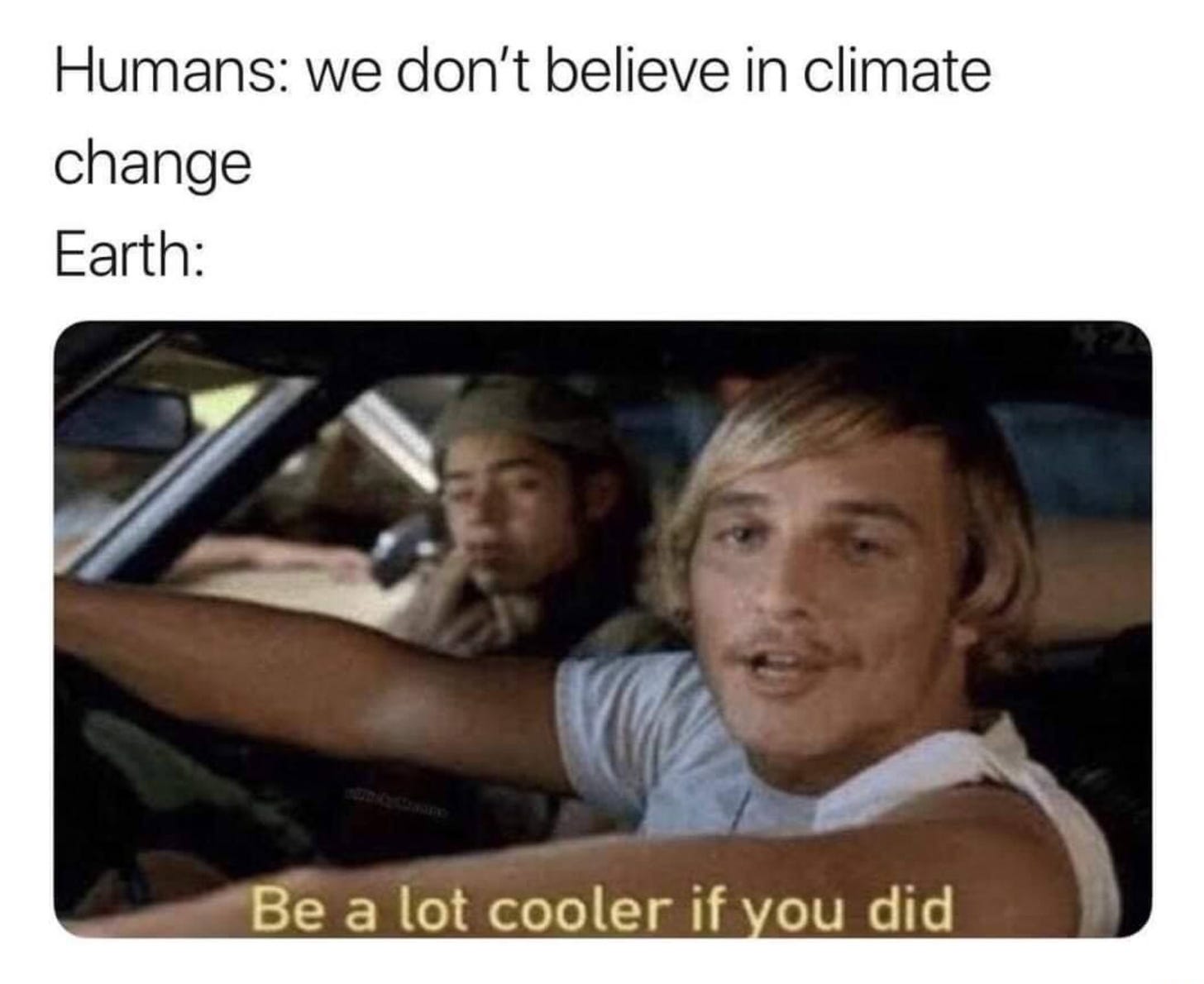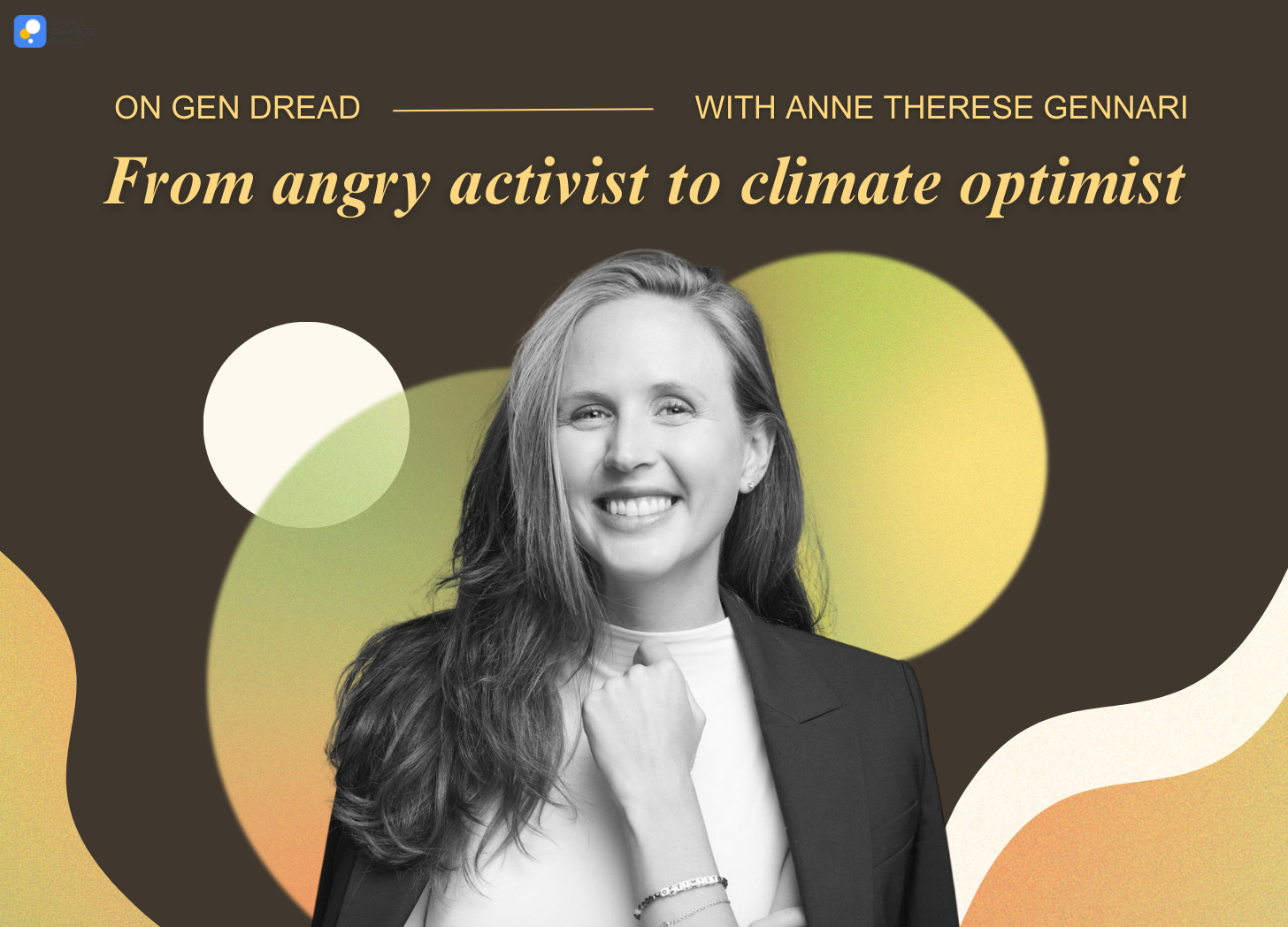From angry activist to climate optimist
Why Anne Therese Gennari believes that climate optimism is essential for leadership
If this newsletter has made a difference in your life and you want to help us imagine a big and bold future, consider becoming a paid subscriber. You can also offer a one-time donation through our partner, Small Change Fund. Thanks for being here!
We all know that toxic positivity glosses over the state of the very real and deeply distressing impacts of our ecological crisis. Yet narratives around imminent doom, or mindsets hellbent on anger without other nourishing emotions in the mix, might not be serving us as leaders and advocates. We sat down with Anne Therese Gennari, a.k.a. “The Climate Optimist”, to talk about what climate optimism means to her, why she developed this approach as a strategy for joyful survival, and how her new course frames practical optimism and grounded hope as essential practices for sustainable leadership.
Anne Therese explains that once you break it down to the most simple principles, and show studies in neuroscience backing the importance of optimism, people quickly get on board. From college students to lifelong activists to industry professionals, she says engaging in optimistic practices is necessary on the path to change. She adds, “It's like we're all waiting for that reminder, that permission almost, to feel good about the world. We tend to forget that the incredible things we've already created came from a willingness to work for change and that radical optimists of the past have paved the path for the world we take for granted today. We didn't make strides because people thought we were doomed. Progress was made because there was an innate willingness to believe in better days, and that we can shape the outcome of tomorrow”.
Have you always been an optimistic person or did you become one?
When I was about 23 years old and after many years of exhausting myself as an activist, I was in my parents’ house and I completely lost it. I fell to the floor and surrendered to the fact that I had no control over this. I remember looking down at my hands and I could see them, but I couldn't feel them. I couldn't move. I just sobbed. Afterwards I lay there with my eyes closed and that's when I felt a message come through. I suddenly had this overwhelming, clear sense that I needed to become an optimist. I had no idea what that meant, because I was so enraged. I was angry with the world and myself and had been harming myself in many different ways, because I just didn't feel like there was any sense of hope in this work. I had been building up this unacknowledged grief for a long time, and my body just could not hold it any longer. I felt like I woke up to a new purpose that day. And it's since then that I've been trying to figure out what it means to be a climate optimist. It’s been a long path. There’s toxic positivity out there and I’m not in denial of the negative, but I learned the hard way that optimistic practices were necessary to sustain this lifestyle and work.
What are the factors that actually spark a sense of optimism in people?
It's a great question. I’ve seen that having a sense of agency is the obvious factor, because a lack of agency often makes you anxious. Agency looks like feeling grounded and connected in the moment, feeling connected to the environment, to other people. It's this sense of embodiment and the choice of like, “I’m well aware that not everything is alright in this world, but at least I feel like I'm centered in myself”. It's coming back to oneself. Because when we act from a place of being grounded, we have the strength to continuously question what can be done and we have the strength to go down hard paths. And it's not about wishful thinking or a delusional approach to things. It’s having a willingness to go back to the drawing board and reflect and be creative and problem solve. And when you’re optimistic, you’re actively looking for opportunities.
So many young people are having to redefine what it means to live a “successful” life amidst an uncertain future. What have you noticed about how the climate crisis impacts decision-making for young people, especially as it relates to their career choices?
I totally understand the thinking of a young person who’s like, “does it make sense for me to spend 10 years climbing a career ladder when we only have 10 years to make massive shifts”? Urgency and doom and gloom messaging are so harmful, but I understand the stress. I was attending a book club event recently and a young man said, “I sometimes ask myself, would it be easier if I just didn't know”? The answer I gave was… sure. Potentially you could be happier. But would you wake up with the same sense of purpose? And so I think, obviously, it's a really harsh reality to understand, yet a big narrative shift for me is the one from responsibility to opportunity. Maybe the fact that things are unraveling and changing rapidly is our opportunity because what if the way things unfold from here leads to a better way of living? And so I think a different question might be “how can I be part of building that better way”?
You designed The Climate Optimist Course to help people spark optimistic leadership. But what if they're not sure what they want to contribute yet or how to be a leader?
It’s definitely for ambitious, career-minded kinds of professionals who burn for this work and want more people to get on this journey with them. But you could be a new mom who wants to find ways to lead or a recent college grad looking to up-level. As long as you want to actively work for a just future, you will benefit. Maybe you don't know yet what your “climate skill” is, or don’t know what to contribute. But I think if you intimately care about other people and the world then you can add a tremendous amount of value to the climate movement. That’s enough. And you’ll start building a network of others who care like you do, and that might also be how you create more resiliency where you live.
I firmly believe that good leadership means slowing down. There's so much data pointing to the fact that we’re depleting our own capacity and trying to do too many things too fast. And that’s why we are so disembodied. For us to invite and imagine the sort of future that wants to emerge, we need different kinds of leadership skills that deal in the inner realm. So a piece of resistance is being slow and open-minded enough to activate that inner journey and will ultimately make you the changemaker the world needs.
Anne Therese’s course is $149 if you sign up before the end of September. After that, our community will always have 20% off with the code GENDREAD ❤️
If you liked reading this, feel free to click the ❤️ button on this post so more people can discover it on Substack 🙏🏼
Making Waves
The Climate Reality Project chaired by former US Vice President Al Gore, is excited to announce the upcoming 57th Climate Reality Leadership training, held virtually for participants from across the US on Oct 17–23, 2024. It offers the unique opportunity to hear directly from former Vice President Gore and an all-star lineup of scientists, policy experts, grassroots and climate justice leaders, and will explore how to ignite real, transformative change. Apply here.
October 1st is International Day of the Older Person. The Climate Crawl through Arts, Culture & Action held in Vancouver, BC, is an immersive experience to explore how the Arts can contribute to climate action and make an impact across the generations. Tickets are free.
‘Till next time!









Hard disagree with this entire position on climate optimism. THERE'S A MASSIVE HOLE IN THE PLANETARY LIFEBOAT! It's time to sober up and take this seriously. Peddling optimism simply enables people to continue doing nothing. It enables denial and business as usual. Please get some serious people on board. If you want to live a fantasy, you might try another planet.
I find it increasingly difficult to practice this, especially given that we are not nearly as post-modern as most would like to think, some of us really do have undiagnosed weird disorders. Yes, yes, positive mindset is important, kinda difficult to hold on to when you're getting increasingly debilitated tho.